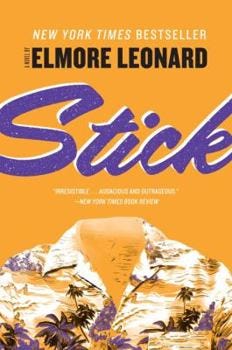What About Elmore Leonard?
Take Heed of his 'Ten Rules of Writing"
One of the best statements about writing from Elmore Leonard came not from his “Ten Rules of Writing” which I will present below as soon as I complete this little ditty. No, the best thing Leonard ever said about writing was to explain a bit about his process.
By the way, his novel “Stick” is one of my favorite books and illustrates perfectly what he says here:
(And I’m paraphrasing what Leonard says:) I create some characters and put them on the page and have them start dialoguing and interacting (note: Leonard would never have used “dialogue” as a verb; that is how we know this is a paraphrase and not a direct quote). Then, as the story progresses, I see that not all of them are germane to the plot so I kill off the one (or ones) I don’t need and continue with the rest.
In Stick, the main character, Earnest Stickley, is an ex-con fresh out of prison. Near the beginning of the story, Stick goes with his buddy on a drug deal, not knowing he (Stick) is set up to take the fall and get killed when the deal goes bad. As luck would have it, though, Stick ends up alive and his buddy gets killed instead.
Hijinks ensue, natch. It’s a damn good read and I wish I had Leonard’s plotting and dialogue skills. But that isn’t what I’m here to talk about, no matter how fascinating his process is.
I promised, and I will deliver to you, Elmore Leonard’s “Ten Rules of Writing.”
Here is where I need to check my ms for the word “suddenly.” “All Hell broke loose” is for sure not in it. Tongue in cheek, of course. Here is Leonard, writing in the NYT in the year 2001: (to soothe the copyright gods I’ve listed only the rules, along with a word or two to nudge the dear readers to the article, linked at the end of this post; it’s also a damn good read)
These are rules I've picked up along the way to help me remain invisible when I'm writing a book, to help me show rather than tell what's taking place in the story. If you have a facility for language and imagery and the sound of your voice pleases you, invisibility is not what you are after, and you can skip the rules. Still, you might look them over.
1. Never open a book with weather. Except …
2. Avoid prologues. Unless …
3. Never use a verb other than ''said'' to carry dialogue. Asseverated?
4. Never use an adverb to modify the verb ''said'' . . . (he admonished gravely.)
5. Keep your exclamation points under control. (two or three per 100,000 words)
6. Never use the words ''suddenly'' or ''all hell broke loose.''
7. Use regional dialect, patois, sparingly. “patois”
8. Avoid detailed descriptions of characters. (no hooptedoodle allowed)
9. Don't go into great detail describing places and things. Unless …
And finally:
10. Try to leave out the part that readers tend to skip.
My most important rule is one that sums up the 10.
If it sounds like writing, I rewrite it. (Joseph Conrad said something about words getting in the way of what you want to say.)
From the New York Times, by Elmore Leonard, July 16, 2001, Writers on Writing, “WRITERS ON WRITING; Easy on the Adverbs, Exclamation Points and Especially Hooptedoodle”
https://archive.is/2byhv
https://www.nytimes.com/2001/07/16/arts/writers-writing-easy-adverbs-exclamation-points-especially-hooptedoodle.html?pagewanted=2&src=pm




My favorite part is the "unless..."
Interesting thing about audiobooks? Said stops being invisible and becomes annoying when heard repeatedly.